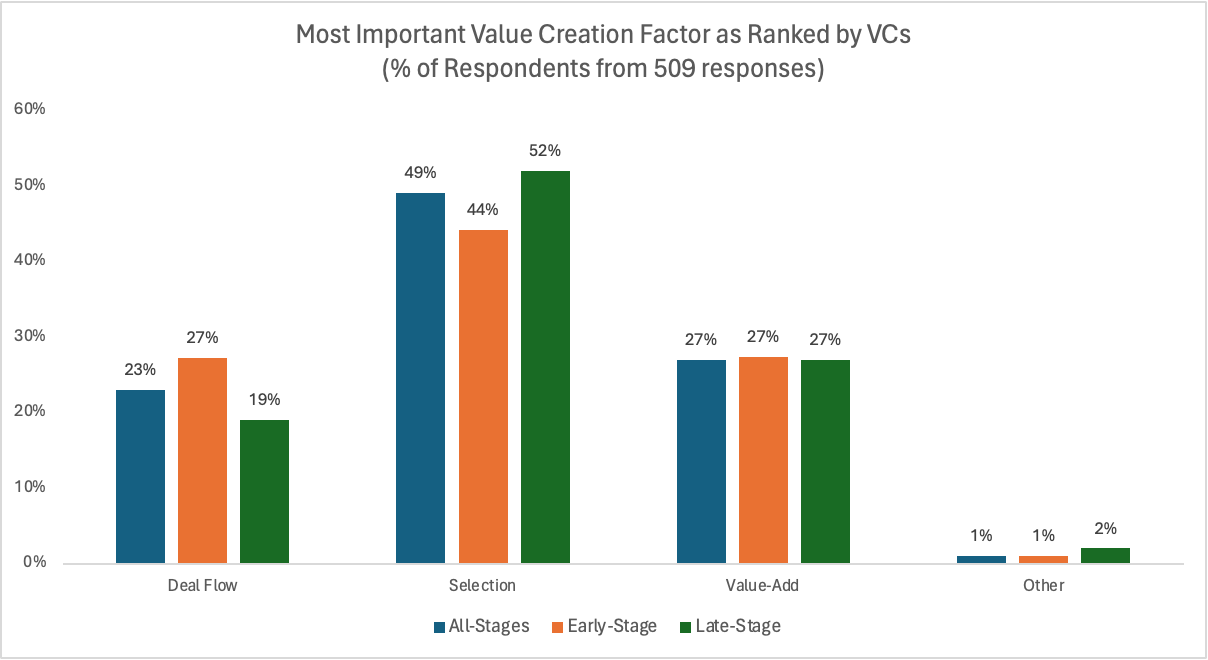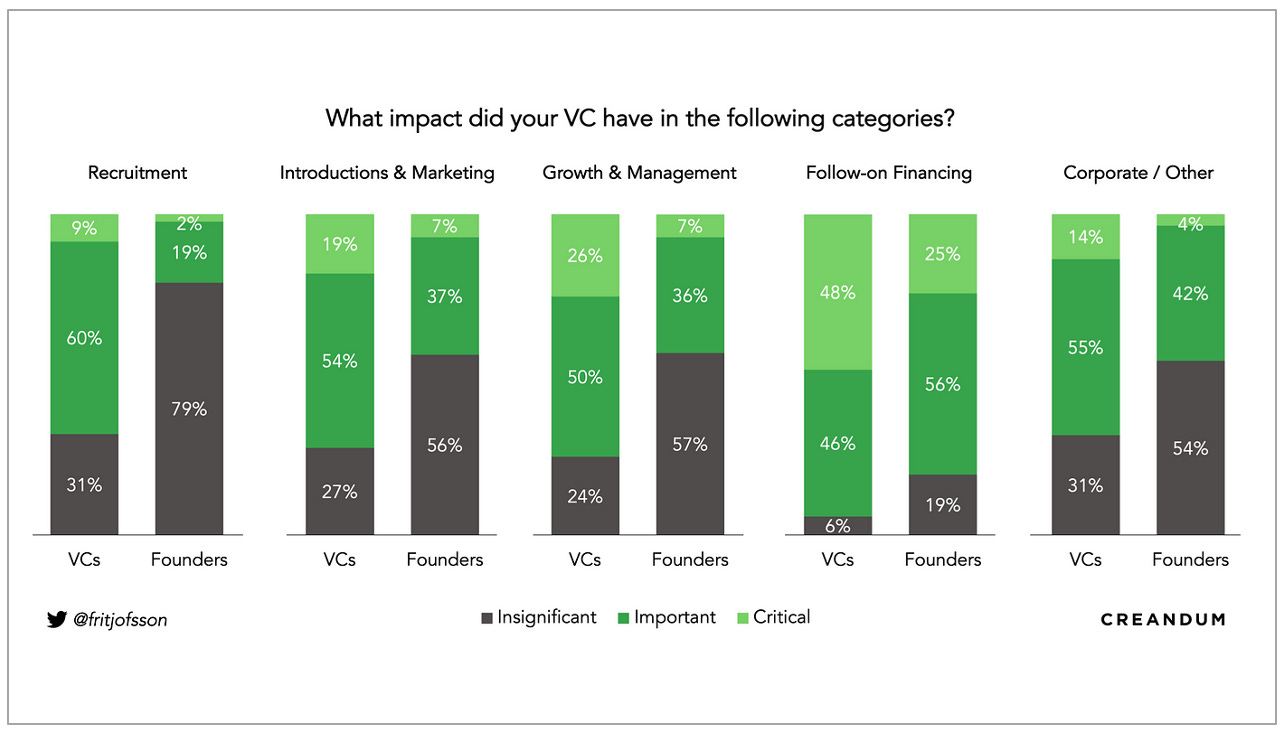To master anything, you need to excel at the fundamentals—the atomic building blocks of a craft. Basketball involves learning how to dribble, pass, and shoot a ball—the absolute basics. Cooking leans heavily on salt, fat, acid, and heat—“the cardinal directions of cooking,” as Samin Nosrat wrote in her best-selling book on the topic. Language, on the other hand, requires mastery of vocabulary, grammar, and semantics.
The venture capital professional also has fundamentals, a set of atomic skills that are prerequisites to doing well in the business. While the full skills list is extensive and includes sourcing, selection, deal structuring, networking, value-add, exits, firm management, and fundraising, VCs spend most of their time in three fundamentally vital areas. I think of these as the three S’s: Sourcing, Selection, and Support.
Sourcing
Drawing on 10+ years of experience in venture capital, Ed Suh nicely sums things up in this Twitter thread on why sourcing matters:
“Sourcing is the foundation of success in venture.
If you aren’t finding & meeting high quality companies, nothing downstream matters: picking, winning, helping is all for naught if you’re not seeing great companies.”
- Ed Suh
The best investors have incredible hustle in this area. They work hard to be in the right place when a great company emerges and do a ton of work to find and meet exceptional founders.
Whether that’s Fred Wilson volunteering for office hours to meet 16 startups back-to-back in four hours (it’s how he sourced Coinbase) or Hummingbird’s team target of meeting 20 to 30 companies a week, each investor has their way of doing things. But whatever that is, they “hang around the hoop” and hustle for a front-row seat to emerging entrepreneurial talent.
Selection
Sourcing and selection are more important than value-add. I will write a separate post about this, but for now, consider two data points in brief. First, there’s compelling analysis that shows sourcing and selection are around twice as important as value-add when it comes to IPO success rates. Second, a survey of 500 experienced VCs ranked “selection” as the most important contributor to value creation.

While sourcing helps with visibility and coverage, knowing when and where a great startup is founded isn’t enough. You must learn how to pick well, too. Here’s Gil Dibner from Angular Ventures on this point:
“Coverage is important. It’s hard to develop insight or achieve any benefits from reinforcement learning unless you are seeing enough. And you need to see “a lot” in order to see anything good. That’s just math.
But, there are two big caveats:
1. You can’t see everything, and someone will always have better coverage than you.
2. There are diminishing returns to coverage. How many first meetings can you actually have? Can you really double your dealflow and keep average quality up?
Ultimately, factors other than coverage drive returns. The most important drivers of returns are (1) contrarian conviction, (2) intimacy with founders to get to ground truth quickly, and (3) insight and expertise on something (markets, technology, teams, GTM, anything).”
Support
Sourcing and selection are only part of the story. Founders also have to pick you, and one of the best ways of proving yourself worthy is by adding value to the founders and ecosystems you invest in.
However, impactful value-add is rarer than VCs like to admit. Only 30% of founders in this survey by Creandum reported that their VCs were helpful enough for these entrepreneurs to consider raising from the same fund again.
In the same report, VCs rated their impact 7.1 out of 10, while founders gave it a score of 5.2. You’ll find similar data in this Forward Partners report, where, despite what many VCs advertise, almost half of founders reported zero value-add from their investors.

Still, some investors can be exceptionally impactful. Here’s Sebastian Mallaby’s summary of a few noteworthy examples in his seminal book about venture capital, The Power Law:
“Admittedly, these contributions can be difficult to pin down. Starting with Arthur Rock, who chaired the board of Intel for thirty-three years, most venture capitalists have avoided the limelight. They are coaches, not athletes. But this book has excavated multiple cases in which VC coaching made all the difference. Don Valentine rescued Atari and then Cisco from chaos. Peter Barris of NEA saw how UUNET could become the new GE Information services. John Doer persuaded the Googlers to work with Eric Schmidt. Ben Horowitz steered Nicira and Okta through their formative years. To be sure, stories of venture capitalists guiding portfolio companies may exaggerate VCs’ importance: in at least some of these cases, the founders might have solved their own problems without advice from their investors. But quantitative research suggests that venture capitalist do make a positive impact: studies repeatedly find that startups backed by high quality VCs are more likely to succeed than others.”
- Sebastian Mallaby
How to Master the Basics and Lean into Your Strengths
Given the importance of sourcing, selection, and support, an investor must be competent in all three areas. Mastery requires it. You can improve these fundamentals through deliberate practice with (1) motivation, (2) well-defined goals, (3) regular feedback, and (4) opportunities to put your skills to work in each area.
Thankfully, you don’t have to be world-class at all three skills in venture to do well. You just need excellence in one or two areas (with sufficient competence in the remainder and/or a complementary investment team), and you’ll do just fine.
Some investors excel at sourcing, others at selection, and some contribute meaningfully through tactical operational support. The trick is to figure out where you are likely to excel.
I’ll close with a long (but highly relevant) quote paraphrased from investor David Friedberg that captures this last point well:
“I think that there’s a class of successful venture capitalists – Bill Gurley is a great example, he was an analyst; Danny Rimer at Index Ventures was an investment analyst; and Mike [...Moritz was a journalist] – there are folks who have an incredible analytical capacity, and that analytical capacity translates into incredible selection capability.
That selection doesn’t necessarily mean that they are going to be the best advisors – and I’m not saying that any of those folks are bad advisors. But there are some venture investors – like Founders Fund is very vocal about this – that their objective is not to be your partner in helping you make decisions and run your company and recruit people, and all the other rigmarole that many VCs go out and tout. They are there to pick the best founders, and the best founders don’t need the VC to be successful. And their job then is to have incredible selection capacity. So, if they can select the best founders and get out of their way, they’ve made a lot of money, and their returns are unbelievable.
And then there are some VCs who are really incredible partners that are [ex-]founders. Josh Kopelman at First Round built an entire firm around this practice, which is to partner very closely with founders and to build support and capabilities. Andreessen Horowitz was built on the same sort of concept, that they would roll all of their [management] fees into building operating support and capacity to support founders and support companies. Both firms have obviously done well in their own right.
So I don’t know if there’s necessarily one breed that predicts success when it comes to success in venture capital.
I will say from my own personal experience, I worked as an investment banker for my first two years out of undergrad. I had a science background, I worked a short stint in private equity, I worked at Google, I did corp dev and M&A there. I started a company, run it, sold it...
So I’ve been on a couple of different places around the table that have given me the ability to provide advice. I don’t know if I necessarily have the same skillset as the team at Founders Fund and Mike Moritz and others might have – [which is] this astute [ability] to spot founders and bring them in. So I think everyone needs to recognise what they do bring to the table and be very clear about what that is.”
🥡 Practical takeaway:
On Sourcing: Hustle your way to get front row seats to emerging entrepreneurial talent. Hang around the hoop. Work hard at finding opportunities before others.
On Selection: Put the reps in by analysing lots of startups. Learn from every investment you make and don’t make. (Thanks Albert Wenger for this one.)
On Support: Aspire to serve founders where you can but first, do no harm! And remember: You’re a coach, not an athlete.




